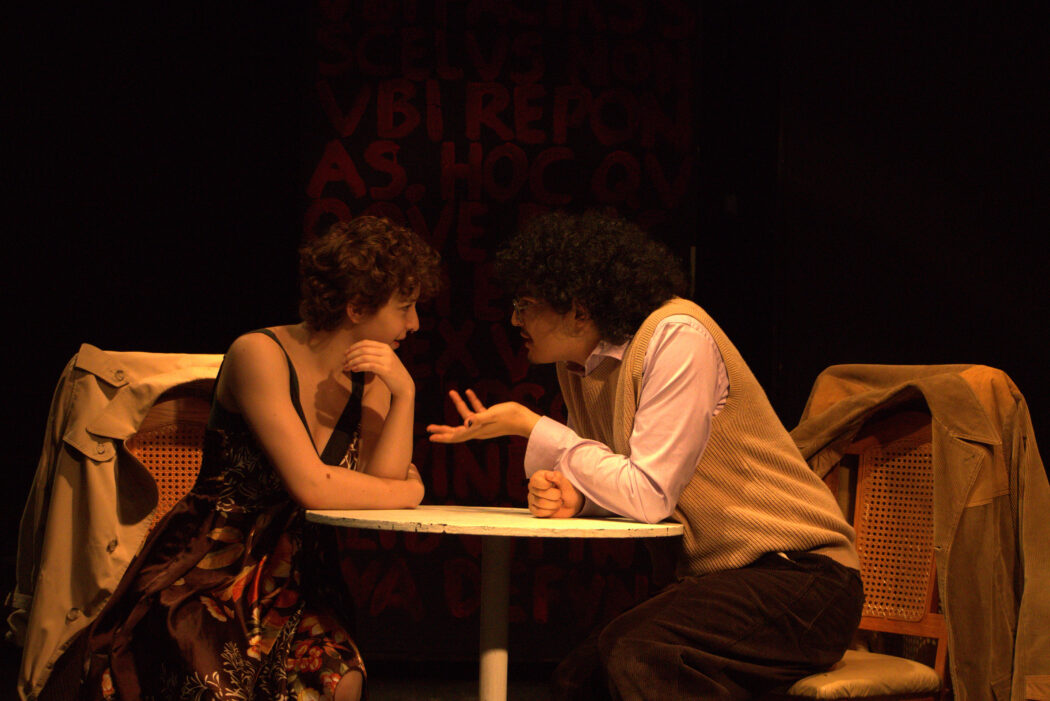On November 15th, I had the immense privilege of stopping by at the Players’ Theatre to see “The Road to Hell,” directed by Henry Kemeny-Wodlinger. Though I had to return the day after due to an unforeseen power outage, I have not enough words to praise this production, though comical, witty, fast-paced, never-boring, unexpected, unique, genuinely heartwarming, and shocking are certainly good places to start.
Within the intimate environment of the Players’ Theatre, the interpersonal dynamics of the pairs take center stage, allowing for the audience to fully immerse themselves within the relationships depicted.
“The Road to Hell” consists of two one-act plays that centre on the budding relationships between two wildly different couples. First, in “Yodellers,” we meet Meg (Tori Rotolo), a soon-to-be US Open golf champion , and Lorne (Hayden Jackson), the writer for the newspaper who interviews Meg the day before her big round. The second act, “Kreskinned,” focuses on a young, new couple, Joyce (Naomi Decker) & Dennis (Mazdak Darvishi), and how their relationship changes in the aftermath of a hypnotist show. With their vastly different plot lines, these two acts may not appear to connect on the surface, yet, at the core of both, the atypical nature of love and how it develops is showcased. Within the intimate environment of the Players’ Theatre, the interpersonal dynamics of the pairs take center stage, allowing for the audience to fully immerse themselves within the relationships depicted.
After their interview together and Meg’s success at the US Open, “Yodellers” follows Lorne and Meg across the various hotel rooms they stay at as they attempt to hide their connection. The magic of “Yodellers” does not stem from a deep, passionate, romantic affair, but rather the exact opposite. Meg is an out and proud lesbian woman, so the basis of their relationship is rooted in their shared love: golf. Though Lorne desires sexual intimacy and Meg is repulsed at the thought, both are enamored by the other’s presence. Bantering at a rate that would suggest that the couple should transition to tennis rather than golf, Meg and Lorne exchange a back and forth that says more about their relationship than any form of sexual intimacy (no matter how much this may bother Lorne). Both Rotolo and Jackson ground their characters in a realism that works, despite the absurdity of the situation. In soft moments of silence, it is clear how deeply Lorne and Meg care for each other, regardless of the asexual nature of their relationship, and this depth of portrayal is a testament to the talents of their respective actors. In particular, the power-out occurred in the middle of their act, and both actors moved on to their next lines as if nothing went wrong, which highlighted the actors’ true professionalism and breadth of their skill.
The uproarious laughter of the crowd is all that is needed to evince Decker and Darvishi’s talent for capturing the essence of their characters and portraying the journey of their absurdist romance.
“Kreskinned” uses Joyce and Dennis, and their blossoming relationship, to reflect on the question of, what if we could erase all the stupid, awful, and weird things we did in relationships? Joyce and Dennis are an odd match. She is a dog trainer who rambles on the transformative power of her experience as a chicken (after the hypnotist), while he is quiet, stuttering, and has been engaged way too many times. Yet, after uncovering that their trigger words are still active, both are able to undo the damage caused by their quirks. Moments such as Joyce revealing her role in an argument with her sister, or Dennis “arriving early” after their first time, display that their oddities could have led to the dissolution of their courtship. However, the amnesia the hypnosis offers allows the couple multiple chances to alleviate their mistakes. This allows the audience to witness the progression of their relationship, as they genuinely appear to connect with one another, regardless of how many mistakes need to be erased. However, this hypnosis also acts as the source of the problem in this relationship – that neither is able to truly be vulnerable in front of the other. Decker and Darvishi portray these quirky lovers who are plagued by their own insecurity with such deft nuance and knowledge of the characters that it seems almost impossible that they also enact impeccable comedic timing. Right off the bat, this act delves into farcical comedy, as both Joyce & Dennis run around, squeal, squawk, and scream, captivating the audience. The uproarious laughter of the crowd is all that is needed to evince Decker and Darvishi’s talent for capturing the essence of their characters and portraying the journey of their absurdist romance.
Amidst all these talented actors, special praise must go towards Mia Gallant-Campagne, Hannah Marder-McPherson, and Irene Newman-Jimenez, who act as the musical accompaniment throughout the play, keeping the flow of the show steady through their harmonies. “The Road to Hell” is anything but a perilous journey, as the actors & singers work in tandem to create an unforgettable experience. I still find myself laughing at scenes such as the sexually charged conversation between Meg and Lorne about golf club shafts & balls, or the hilariously awkward nature of Joyce and Dennis’ sexual encounters. Kemeny-Wodlinger, as well as stage manager Megan Siow, deserve immense praise for adapting this play and elevating its charm through cleverly crafted dialogue, the casting of wildly talented actors, cultivating an intimate setting, and overall creating an atmosphere of pure enjoyment.








